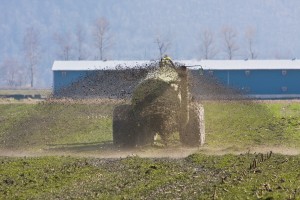Parlamento: Solo la agricultura sostenible puede llamarse ‘çlimaticamente inteligente’
La agricultura sólo puede llamarse “climaticamente inteligente ” cuando realmente contribuye a la sostenibilidad ambiental de la producción de alimentos y la seguridad alimentaria. El Parlamento ha aprobado para esto una moción de Marianne Thieme. En la actualidad, el concepto se utiliza tan suelto que incluso puede incluir mega establos.

La política del gobierno está plenamente comprometido con la agricultura climáticamente inteligente (Climate smart agriculture). Casi todas las formas de la agricultura caen bajo este nombre en este momento , incluso los mega establos. El Parlamento ahora quiere poner fin a esta incertidumbre.
Una gran mayoría votó a favor de una moción de Marianne Thieme para una definición clara y crujiente, de la agricultura climáticamente inteligente. De ahora en adelante sólo la agricultura que realmente contribuye a la transformación ecológica de la producción mundial de alimentos y garantiza el derecho a la alimentación puede llamarse “climaticamente inteligente”.
Marianne Thieme: “La agricultura industrial pone una presión muy grande sobre los animales, el medio ambiente y los derechos humanos. El gobierno está tratando de poner una salsa verde aquí llamando a esta agricultura devastadora “climaticamente inteligente”. Ahora que el Parlamento ponga fin a estas prácticas de lavado verde, tiene que estimular las iniciativas verdaderamente sostenibles.”
Con la resolución aprobada, el gobierno debe finalmente atender a los deseos tanto del Parlamento como del Relator Especial de la ONU sobre el derecho a la alimentación, para centrarse en la agricultura ecológica a pequeña escala.
Abuso
Cientos de ONG, entre ellas Cordaid y Friends of the Earth, han alarmado anteriormente elaborado antes obre el abuso del término. Advierten que al llamar a la agricultura industrial ‘çlimaticamente inteligente’ los multinacionales pueden conseguir fondos que deberían destinarse a la estimulación de pequemos agricultores agro-ecológicos.
Only when it truly contributes to the greening of our food production and security should agriculture be called “climate-smart”. The Lower House has passed a motion on this subject introduced by Marianne Thieme. At present, the term is used so casually that it occasionally even includes factory farms.

The government policy will fully engage in climate-smart agriculture. At the moment, this still includes virtually any form of agriculture, even factory farming. The Lower House wants to see an end to this lack of clarity.
A large majority of parliament has supported a motion by Marianne Thieme to adopt a clear and distinct definition of climate-smart agriculture. From now on, only agriculture that truly contributes to the greening of global food production and to ensuring the right to food may be called “climate-smart”.
Marianne Thieme: “Industrial agriculture puts severe pressure on animals, the environment and human rights. By calling this destructive form of agriculture “climate-smart”, the government has tried to give it a green veneer. However, now that the Lower House has foiled these greenwashing practices, the government will be forced to promote initiatives that are truly sustainable.”
The adopted motion will force the government to finally meet the wishes of both Lower House and the UN Special Rapporteur on the right to food, to concentrate on small-scale organic farming.
Improper use
Hundreds of NGOs including Cordaid and Friends Of The Earth have already sounded the alarm over the improper use of the term. They have warned that by designating industrial farming as “climate-smart”, multinationals will rake in the money that should be intended for encouraging small, agro-ecological farmers.